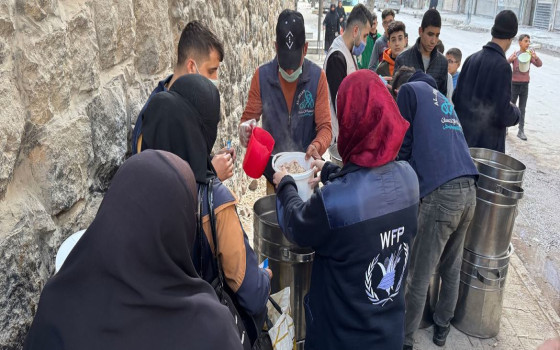
The situation in Gaza, Syria and Lebanon.. Israel prevents aid missions to Gaza, and difficult conditions in the camps of displaced Syrians.. and UNIFIL: Concern over the destruction of homes and agricultural lands of the Lebanese

- Europe and Arabs
- Friday , 27 December 2024 9:33 AM GMT
Capitals: Europe and the Arabs
The United Nations Office for the Coordination of Humanitarian Affairs (OCHA) reported that the Israeli authorities continue to reject and obstruct the majority of humanitarian aid missions throughout the Gaza Strip.
Of the 12 requests to the United Nations to coordinate humanitarian movements on Wednesday, six were flatly rejected, three were cancelled by the organizers due to security or logistical challenges, one was approved but faced obstacles, and two others were facilitated and completed.
OCHA said that two attempts to reach the besieged parts of the northern Gaza Strip governorate were rejected on Wednesday and Thursday. According to the UN daily news bulletin
Despite the restrictions on access and insecurity, aid organizations are working hard to help the most vulnerable, as the humanitarian situation in Gaza continues to deteriorate.
In a statement issued on Thursday, the United Nations indicated that most families in the Strip cannot afford the expensive cost of basic food items, as the price of a 25-kilogram bag of wheat flour ranges between the equivalent of $160 and $190.
She said humanitarian partners working to address hunger in Gaza estimate that, as of mid-December, 10,000 metric tons of wheat flour are needed to distribute one bag of flour to all families in Deir al-Balah, Khan Younis and Rafah. Without this, food insecurity in the central and southern areas of the Strip will worsen.
Meanwhile, the Office for the Coordination of Humanitarian Affairs said it continues to receive daily reports of civilian deaths and injuries across Gaza due to the ongoing hostilities, which are also causing widespread destruction and displacement. The UN agency reiterated the need to protect and avoid targeting civilians and civilian infrastructure, including hospitals.
In Syria, the UN Office for the Coordination of Humanitarian Affairs said the UN and its humanitarian partners are providing assistance to people in need across Syria, including in the northwest.
The office reported that cross-border aid deliveries from Turkey continue unhindered.
It added that more than twenty trucks carrying aid from three UN agencies have crossed into Idlib using the Bab al-Hawa border crossing. Since the beginning of the year, 777 UN aid trucks have crossed into northwest Syria from Turkey.
Camps damaged by rain and floods
Meanwhile, the Office for the Coordination of Humanitarian Affairs warned that conditions in northwest Syria remain difficult in displacement camps in Idlib and northern Aleppo, where winter is making life even more difficult for some 730,000 people living in tents.
Days ago, more than 200 family tents in four camps were damaged by flooding caused by heavy rains. Since the beginning of 2024, floods and strong winds have damaged more than 8,800 family tents, including nearly 2,000 completely destroyed, in 260 camps.
The office said that most families living in displacement camps expressed a desire to return to their areas of origin but said they were unable to do so due to the lack of adequate services and damaged infrastructure in their towns of origin, as well as the presence of explosive remnants.
Casualties from explosive ordnance
The Office for the Coordination of Humanitarian Affairs said that since 26 November, humanitarian mine action partners have identified 109 new minefields in Idlib, Aleppo, Hama and Latakia. To date, they have destroyed more than 650 pieces of explosive ordnance.
It said landmine explosions in northwest Syria were reported to have caused at least nine casualties, including one child, on 24 and 25 December alone.
Since 8 December, incidents involving explosive ordnance have killed more than 70 civilians across Syria – including 10 children and five women – and injured dozens more, according to the Syrian Observatory for Human Rights.
The office said there were continuing reports of Israeli military activity in and around the Golan Heights.
On Wednesday, Israeli forces reportedly injured six civilians when they opened fire in the town of Suwaysa in Quneitra Governorate. Residents were ordered to evacuate, and the Israeli military imposed a curfew.
In Lebanon, the United Nations Interim Force in Lebanon (UNIFIL) said that any actions that threaten the fragile cessation of hostilities must cease.
In a statement issued yesterday, UNIFIL explained that both Israel and Lebanon affirmed their commitment to the full implementation of UN Security Council Resolution 1701, stressing that to address outstanding issues, the parties are called upon to utilize the newly established mechanism as agreed in the understanding.
UNIFIL urged the timely withdrawal of the Israeli army, the deployment of the Lebanese Armed Forces in southern Lebanon, and the full implementation of Resolution 1701 as a comprehensive path to peace.
It stressed that it is working closely with the Lebanese Armed Forces as it accelerates recruitment efforts and redeploys forces to the south.
It said it stands ready to play its part in supporting the two countries in fulfilling their commitments and in monitoring progress, including ensuring that the area south of the Litani River is free of any armed personnel, assets or weapons other than those of the Government of Lebanon and UNIFIL, as well as respect for the Blue Line.
She expressed concern about the continued destruction by the Israeli army of residential areas, agricultural land and road networks in southern Lebanon, noting that this constitutes a violation of resolution 1701. The UN mission stressed that peacekeepers will continue their assigned tasks, including monitoring all violations of resolution 1701 and reporting them to the Security Council.












No Comments Found